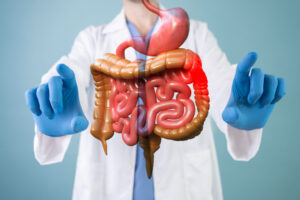Let’s embark on a journey to uncover the fascinating relationship between diet and digestion. From the moment food enters your mouth to its final destination in the toilet bowl, every bite plays a crucial role in your overall health and well-being. So, grab a seat and let’s delve into the world of diet and digestion with our Best Gastroenterologist.
Introduction
Ever wondered why some foods make you feel energized while others leave you feeling sluggish? The secret lies in your digestive system – the powerhouse responsible for breaking down food into nutrients your body can absorb. But it’s not just about what you eat; it’s about how your body processes it. Join me as we explore the intricate dance between diet and digestion with best gastroenterologist, and how making mindful choices can lead to a happier, healthier gut.

The Digestive System: An Overview
Your digestive system is like a well-oiled machine, composed of various organs working in harmony to process food. From the moment you take a bite, your mouth begins the process of digestion by breaking down food into smaller pieces with the help of enzymes in saliva. As food travels down the esophagus, it enters the stomach, where stomach acid further breaks it down into a semi-liquid substance called chyme. Next stop: the small intestine, where nutrients are absorbed into the bloodstream. Finally, the leftovers make their way to the large intestine, where water is absorbed, and waste is formed.
The Role of Nutrition in Digestion
Nutrition is the fuel that powers your digestive system. Each nutrient – carbohydrates, proteins, fats, vitamins, and minerals – plays a unique role in maintaining digestive health. Carbohydrates provide energy, proteins repair tissues, fats aid in nutrient absorption, while vitamins and minerals act as coenzymes in various metabolic processes. A balanced diet ensures that your digestive system has everything it needs to function optimally or you can consult with best gastroenterologist which helps you in finding the best nutrition.
Impact of Different Food Groups
Not all foods are created equal when it comes to digestion. Fiber-rich foods, such as fruits, vegetables, and whole grains, keep things moving smoothly by adding bulk to your stool and preventing constipation. On the other hand, processed foods high in sugar and fat can wreak havoc on your digestive system, leading to bloating, gas, and discomfort. It’s all about making smart choices that support your gut health.
Fiber: Nature’s Broomstick
Think of fiber as nature’s broomstick, sweeping through your digestive tract and keeping it clean and healthy. Soluble fiber, found in foods like oats and legumes, absorbs water and forms a gel-like substance that slows digestion and promotes satiety. Insoluble fiber, found in foods like nuts and seeds, adds bulk to stool and prevents constipation. Aim to include a variety of fiber-rich foods in your diet for optimal digestive health.
Hydration: The Unsung Hero
Water is essential for proper digestion. It helps dissolve nutrients, aids in the absorption of minerals, and keeps things moving smoothly through your digestive tract. Dehydration can lead to constipation and other digestive issues, so be sure to drink plenty of water throughout the day. Herbal teas and water-rich foods like fruits and vegetables can also contribute to your daily fluid intake.
Probiotics: Your Gut’s Best Friend
Probiotics are live bacteria and yeasts that are good for your digestive system. They help maintain a healthy balance of gut bacteria, which is essential for proper digestion and immune function. Yogurt, kefir, kimchi, and sauerkraut are all excellent sources of probiotics. Adding these foods to your diet can promote gut health and reduce the risk of digestive disorders.
Eating Habits: Fast or Slow, What’s Best?
How you eat is just as important as what you eat. Eating slowly allows your body to properly digest and absorb nutrients, while eating too quickly can lead to overeating and digestive discomfort. Chew your food thoroughly, savor each bite, and pay attention to your body’s hunger and fullness cues. Mindful eating not only improves digestion but also enhances your overall dining experience.
Stress Eating: A Gut-Wrenching Habit
Stress can wreak havoc on your digestive system. When you’re stressed, your body releases hormones that can alter gut motility and increase sensitivity to pain. This can lead to symptoms like stomachaches, diarrhea, or constipation. Finding healthy ways to manage stress, such as exercise, meditation, or spending time with loved ones, can help alleviate digestive symptoms and improve overall well-being.
Signs of a Healthy Digestive System
A healthy digestive system operates like a well-oiled machine, with regular bowel movements, minimal bloating, and no discomfort after eating. Signs of good digestive health include regular bowel movements, minimal gas and bloating, and comfortable digestion after meals. If you experience persistent digestive issues, it may be a sign of an underlying condition, and it’s essential to consult with the best gastroenterologist for proper evaluation and treatment.
When to Consult the Best Gastroenterologist
If you experience persistent digestive symptoms such as abdominal pain, bloating, diarrhea, or constipation, it’s essential to seek medical advice. The best gastroenterologists are experts in diagnosing and treating a wide range of digestive disorders, from acid reflux to inflammatory bowel disease. Don’t ignore your gut health – schedule a consultation with a gastroenterologist to address any concerns and get back on track to optimal digestive health.
Conclusion
Your diet plays a significant role in your digestive health, influencing everything from bowel movements to nutrient absorption. By making mindful choices and prioritizing nutrient-rich foods, you can support a healthy digestive system and improve your overall well-being. Remember to listen to your body, stay hydrated, and seek medical advice if you experience persistent digestive symptoms. With the right approach, you can enjoy a happy, healthy gut for years to come.
